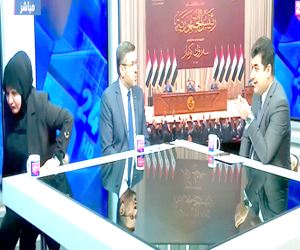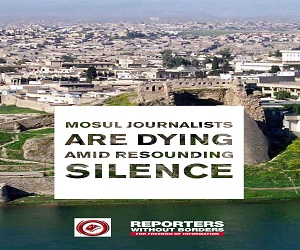
As part of its ongoing monitoring of Iraq's press freedom situation, JFO followed and monitored the proceedings of the verbal altercation that took place in one of "Kashef Hesab" program's episodes, presented by "Mohammed Qais" on "Iraq 24" TV Chanel (May 30, 2022). The episode concluded with the leaving of MP Madiha Al-Moussawi, a member of the Parliamentary Services and Reconstruction Committee in the Iraqi Parliament.
The Journalistic Freedoms Observatory "JFO" would like to raise several concerns in this regard and direct them to MP Al-Moussawi, members of her committee and bloc, and the rest of her fellow elected representatives in the fifth parliament session.
1 - The dialogue illustrates The presenter's question to the MP discussing the services budget and its link to the Food Security Law, which is a tight relationship at the core of the MP's responsibilities.
2 - In her response, the MP used phrases inappropriate for an official dealing with the press and Iraqi public opinion, such as :"I do not like this.. I do not like to be fooled..this is not working with me.. I am Madiha Al-Moussawi.. neither you nor anyone else could place me in an embarrassing situation, you should be aware of who you're speaking".
3 - JFO calls on politicians, particularly those connected with parties related to armed groups, to adjust their language to media to avoid producing misunderstandings. As in the mentioned episode, the presenter felt threatened live when the MP said, "you should be wary of who you're speaking to," especially since Iraq's record is full of threats, intimidation, kidnapping, and assassination of journalists.
4 - JFO emphasizes to parliamentarians and government officials the significance of distinguishing between the language used in internal political party disagreements and the manner and vocabulary used while conducting a journalistic interview.
5 - If a political speaker is unfamiliar with his or her work or committee, he or she should learn more before deciding to appear in the media. He or she should prepare for it, or at the very least calmly tell the interviewer, "I have no knowledge about the issue," without displaying nervousness and doubts about the "motives for asking the question," Which approach is linked with totalitarian regimes.
6 - Attempting to obtain a "scoop" is one of the legitimate rights, but rather it is the duty of journalists. However, the MP demonstrated a lack of understanding of this when she used the phrase "Do not give it a scoop," mistaking a routine question about service allocations in the Food Security Law as an attempt to obtain a "scoop."
7 - The guest's withdrawal from televised dialogues is a legitimate right. Still, it has commonly associated reasons, including being exposed to a health problem or the interviewee's failure to divide the time appropriately between the parties to the discussion or the dialogue touched on serious breaches that affect the guest's constants, or the television episode includes another guest without informing the first guest. Withdrawing away in disagreement to routine queries and without a reasonable explanation places the withdrawing visitor in the midst of several contentious questions.
8 - The appearance of legislative, executive, or judicial authorities in press interviews is one of their tasks in a country attempting to develop on the road of democracy and free speech in a way that assures public opinion is educated towards the truth. Given Iraq's lack of access to information, hosting officials is practically the only way to provide information.
9 - JFO urges political parties and coalitions to devote a portion of their funds to teaching its members how to participate in dialogues, whether with citizens or journalists, before permitting them to make public appearances.
10 - JFO advises the new MPs to invest some of their time in following up on press dialogues performed by their peers with journalists in countries with advanced or medium democratic experiences in order to observe how the system works.
11 - JFO encourages fellow political program hosts and PR officials of media organizations to select appropriate guests who exhibit an acceptable level of tact, and have enough information or opinions in line with respecting the times of the audience watching the press. Also, we encourage them to refrain from hosting personalities who cannot benefit the public through opinion or information.
The Journalistic Freedoms Observatory "JFO" wants to remind that, in light of the infringements made by the new legislative and executive officials, the "black list" will be reactivated to include officials who appear hostile to the press and freedom of expression in Iraq.






.jpg)



.png)





